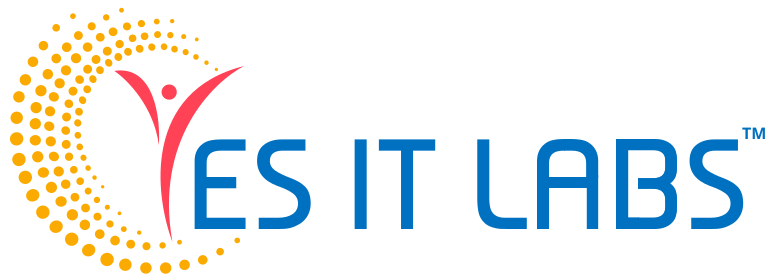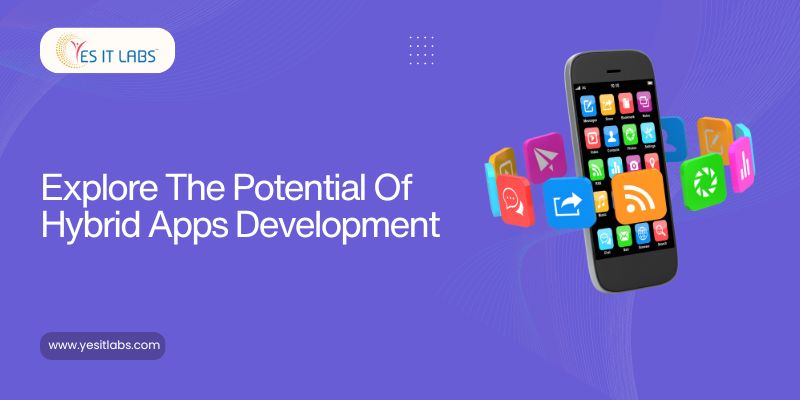Hybrid app development plays a crucial role in engaging users across platforms. Hybrid app development offers a versatile solution by combining the benefits of native and web applications. This comprehensive guide explores the top hybrid app frameworks that empower developers to build robust, scalable, and cost-effective mobile apps, catering specifically to the needs of the USA audience.
Understanding Hybrid App Development
Hybrid app development bridges the gap between native and web applications. It allows developers to use web technologies like HTML, CSS, and JavaScript to create applications that can run natively on multiple platforms, such as iOS and Android. Unlike purely native apps, hybrids leverage a single codebase for deployment across different operating systems, streamlining development efforts and reducing time-to-market.
Benefits of Using Hybrid App Frameworks
Hybrid frameworks offer several advantages that make them increasingly popular among businesses and developers alike:
- Cross-Platform Compatibility: Hybrid frameworks enable developers to write once and deploy across multiple platforms, ensuring wider reach and consistency in user experience. This capability is essential for businesses aiming to target both Android app development and iOS app development users without maintaining separate codebases.
- Cost-Effectiveness: By using a single codebase for multiple platforms, businesses can significantly reduce development costs compared to building separate native apps. This approach not only saves on initial development expenses but also streamlines maintenance and updates.
- Faster Development: Rapid prototyping and quicker iterations are facilitated through hybrid frameworks, enhancing agility in response to market demands. Developers can leverage web technologies and existing skills to accelerate development cycles, delivering products to market faster.
- Access to Plugins: Most hybrid frameworks offer extensive plugin libraries, granting developers access to native device features like camera, GPS, and notifications. This accessibility simplifies the integration of device-specific functionalities, enhancing the overall functionality and user experience of hybrid apps.
- Uniform UI/UX Design: Hybrid frameworks support UI components that mimic native elements, allowing developers to maintain a consistent look and feel across platforms. This uniformity is crucial for brand consistency and user familiarity, contributing to enhanced usability and user satisfaction.
Top 15 Hybrid App Frameworks in the Market
Let’s delve into the details of the top 15 hybrid app frameworks that are shaping the future of web application development:
- Ionic
- Description: Ionic is a popular open-source framework for building cross-platform mobile apps using web technologies. It is built on Angular and Apache Cordova, offering a robust set of UI components and tools for building performant apps.
- Key Features: Ionic provides seamless integration with Angular, extensive pre-built UI components, and access to native device plugins. It supports rapid development and deployment across iOS app development and Android app development platforms.
- React Native
- Description: Developed by Facebook, React Native enables developers to build native mobile apps using React.js and JavaScript. It allows for code reusability across platforms, delivering near-native performance and user experience.
- Key Features: React Native emphasizes a declarative programming model, allowing developers to create UIs with React components. It benefits from a strong community ecosystem, continuous updates, and support for third-party plugins.
- Flutter
- Description: Google’s Flutter is a UI toolkit for building natively compiled applications for mobile, web, and desktop from a single codebase. Using the Dart programming language, Flutter offers high-performance rendering and a customizable widget set.
- Key Features: Flutter supports hot reload for quick iterations, enabling developers to see changes instantly. It provides a rich set of UI components, platform APIs, and extensive documentation for building complex apps efficiently.
- PhoneGap (Apache Cordova)
- Description: Adobe’s PhoneGap, also known as Apache Cordova, allows developers to build mobile apps using HTML, CSS, and JavaScript. It provides access to native device APIs through plugins, facilitating cross-platform app development.
- Key Features: PhoneGap offers a large plugin library for accessing device features, cloud-based build services for simplified deployment, and compatibility with multiple platforms including iOS app development, Android app development, and Windows.
- Xamarin
- Description: Xamarin, owned by Microsoft, is a cross-platform framework that uses C# and .NET to create native apps for iOS, Android, and Windows. It allows developers to share code across platforms while offering full access to native APIs and native-like performance.
- Key Features: Xamarin integrates seamlessly with Visual Studio and offers Xamarin.Forms for building UIs across platforms. It benefits from Microsoft’s ecosystem, extensive libraries, and robust community support.
- Framework7
- Description: Framework7 is a full-featured HTML framework for building iOS and Android apps with a native look and feel. It is designed to work with Vue.js and React, providing an extensive set of UI components and animations.
- Key Features: Optimized for touch devices, Framework7 supports seamless DOM manipulation and native scrolling. It offers customization options and excellent performance and is suitable for developing visually appealing hybrid apps.
- Onsen UI
- Description: Onsen UI is a hybrid mobile app development framework that focuses on creating beautiful and performant apps using HTML5 and JavaScript. It provides a library of ready-to-use components for building cross-platform applications with Angular and React.
- Key Features: Onsen UI offers native-like animations, cross-platform UI components, and a command-line interface (CLI) for project management. It supports both Material Design and iOS themes, catering to diverse design preferences.
- Sencha Touch
- Description: Sencha Touch is a comprehensive framework for building data-intensive hybrid mobile apps with HTML5 and JavaScript. It follows the MVC architecture, providing a rich set of customizable UI components and tools for rapid app development.
- Key Features: Sencha Touch includes native packaging options, detailed documentation, and support for offline capabilities. It is suitable for enterprise-grade applications requiring complex data visualization and interactivity.
- Vue Native
- Description: Vue Native combines the Vue.js framework with React Native components to build native mobile apps using Vue.js syntax. It allows developers to leverage Vue’s reactive data binding and component-based architecture for cross-platform development.
- Key Features: Vue Native supports direct integration with Vue.js, modular architecture, and Vuex for state management. It enables developers to reuse Vue components and plugins within a React Native environment, enhancing code reusability and development efficiency.
- NativeScript
- Description: NativeScript enables developers to build native mobile apps using JavaScript, TypeScript, or Angular. It provides direct access to native APIs, allowing for native-like performance and functionality across iOS app development and Android app development platforms.
- Key Features: NativeScript supports Angular and Vue.js frameworks, enabling developers to share a single codebase for multiple platforms. It emphasizes performance optimization, UI customization, and seamless integration with native libraries.
- Quasar Framework
- Description: Quasar is a high-performance Vue.js framework for building responsive websites, PWAs, and hybrid mobile apps. It supports a single codebase for various platforms, including iOS app development, Android app development, and desktop, leveraging Vue’s ecosystem for efficient development.
- Key Features: Quasar offers SSR (Server-Side Rendering) readiness, a powerful CLI, and an extensive library of UI components. It provides a platform-agnostic approach, allowing developers to target multiple environments with minimal effort.
- Corona SDK
- Description: Corona SDK is a cross-platform framework for developing 2D games and interactive apps. It uses the Lua scripting language and offers real-time testing, a plugin marketplace, and support for iOS app development and Android app development platforms.
- Key Features: Corona SDK prioritizes performance and ease of use, making it ideal for indie game developers and small teams. It provides access to native APIs, advanced graphics rendering, and monetization options for app distribution.
- Framework 7
- Description: Framework 7 is an HTML framework designed for building iOS and Android apps with a native-like user interface. It supports Vue.js and React integrations, offering responsive UI components and animations for hybrid mobile app development.
- Key Features: Framework 7 optimizes touch interactions, supports seamless DOM manipulation, and includes a variety of UI widgets. It focuses on delivering a native feel across different mobile platforms, enhancing user experience and app performance.
- Tabris.js
- Description: Tabris.js enables developers to create native iOS and Android apps using JavaScript and TypeScript. It offers a native UI toolkit, an Eclipse-based IDE, and direct access to native APIs for enhanced performance and functionality.
- Key Features: Tabris.js supports TypeScript for type safety and code completion, facilitates rapid prototyping with hot reload, and includes a rich set of UI components. It is suitable for building enterprise-grade applications requiring native integration and high performance.
- Appcelerator Titanium
- Description: Appcelerator Titanium allows developers to build native mobile apps using JavaScript, HTML, and CSS. It provides direct access to native APIs and offers an MVC framework (Alloy) for rapid development and code reusability.
- Key Features: Appcelerator Titanium supports cross-platform development for iOS app development, Android app development, and Windows, leveraging a single JavaScript codebase. It integrates with popular IDEs, offers extensive documentation, and emphasizes native performance optimization.
Key Features and Capabilities of Each Framework
Each hybrid app framework brings unique strengths and capabilities to the table, catering to diverse development needs and project requirements. Developers can leverage these frameworks to enhance app performance, streamline development workflows, and deliver exceptional user experiences across platforms.
Choosing the Right Hybrid App Framework for Your Project
Selecting the right hybrid app framework depends on various factors, including project requirements, development expertise, performance goals, and long-term scalability. Consider conducting a thorough evaluation of each framework’s features, community support, integration capabilities, and compatibility with existing technologies.
Additional Considerations for Hybrid App Development
Beyond framework selection, optimizing hybrid app development involves addressing key considerations such as security, UX design, testing, and CI/CD practices. Implement robust security measures, prioritize intuitive UX design, and adopt automated testing strategies to ensure app quality and performance.
Future Trends in Hybrid App Development
Looking ahead, hybrid app development is poised to evolve with advancements in AI/ML integration, Progressive Web Apps (PWAs), and augmented reality (AR) experiences. Stay informed about emerging trends and technologies to leverage hybrid frameworks effectively and drive innovation in mobile app development.
Conclusion
Hybrid app frameworks empower developers to build sophisticated mobile applications efficiently, combining the best of native and web technologies. By understanding the capabilities and strengths of each framework, businesses can make informed decisions to accelerate app development, optimize costs, and deliver seamless user experiences across platforms.
Explore these top hybrid app frameworks to harness their potential and propel your mobile app projects to success in today’s competitive digital landscape. Stay updated with the latest advancements and best practices in hybrid app development to stay ahead of the curve and achieve your business objectives effectively.









